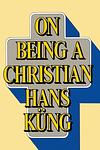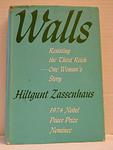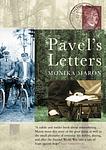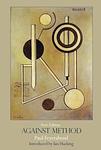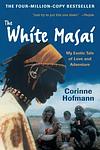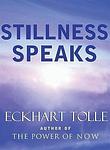The Greatest German, Swiss "Nonfiction" Books Since 1970
Click to learn how this list is calculated.
This list represents a comprehensive and trusted collection of the greatest books. Developed through a specialized algorithm, it brings together 284 'best of' book lists to form a definitive guide to the world's most acclaimed books. For those interested in how these books are chosen, additional details can be found on the rankings page.
Genres
Countries
Date Range
Reading Statistics
Click the button below to see how many of these books you've read!
Download
If you're interested in downloading this list as a CSV file for use in a spreadsheet application, you can easily do so by clicking the button below. Please note that to ensure a manageable file size and faster download, the CSV will include details for only the first 500 books.
Download-
1. The Rings of Saturn by W. G. Sebald
"The Rings of Saturn" is a richly detailed travelogue that follows the narrator's journey along the coast of Suffolk, England. The narrative weaves together history, literature, and personal anecdotes, exploring topics as diverse as the decline of the herring industry, the horrors of colonialism in the Congo, and the life of philosopher Sir Thomas Browne. The book is characterized by its melancholic tone, its digressive style, and its meditative reflections on memory, time, and decay.
-
2. The Emigrants by Winfried Georg Sebald
"The Emigrants" is a novel that explores the experiences and memories of four different emigrants, each with a unique and complex history. The narrative primarily focuses on the psychological impact of displacement and the haunting nature of the past. The author delves deep into their lives, revealing their struggles with identity, loss, and the persistent influence of their roots. The narrative is interwoven with historical events, photographs, and other documents, creating a rich tapestry that blurs the line between fact and fiction.
-
3. I Will Bear Witness by Victor Klemperer
"I Will Bear Witness" is a chilling personal account of life in Nazi Germany from 1933-1941. The author, a Jewish professor, meticulously details the daily life under Hitler's regime, capturing the fear, oppression, and constant threat that Jews faced. The diary serves as a powerful testament to the horrors of the Holocaust and the resilience of those who endured it.
-
4. Mars by Fritz Zorn
"Mars" is a poignant autobiographical account of a young man's life and his battle with terminal cancer. The narrative delves into the author's affluent yet emotionally barren upbringing in a Swiss suburb, which he refers to as "Mars," symbolizing its cold and alienating environment. The book is a critique of his repressive bourgeois society, which he believes contributed to his psychological and physical illness. Through introspective and often angry prose, the author explores themes of alienation, the search for identity, and the impact of societal norms on individual well-being. His struggle is not only against the disease but also against the cultural and familial constraints that stifled his emotional development.
-
5. Grid Systems In Graphic Design by Josef Müller-Brockmann
This book is a seminal guide to graphic design and typographic composition, focusing on the use of grid systems as a foundational tool for ensuring visual coherence and hierarchy across various design projects. It provides designers with a methodical approach to organizing text and images in a clean, logical, and aesthetically pleasing manner. Through systematic arrangement, the grid serves as an essential framework that can be applied to a wide range of design work, from print media to digital interfaces. The book delves into the principles, applications, and benefits of grid systems, offering practical advice, examples, and clear illustrations to help designers harness the power of grids to create effective, impactful visual communications.
-
6. On Being A Christian by Hans Kueng
The book in question is a comprehensive exploration of Christian faith and its relevance in the modern world. It delves into the historical and philosophical foundations of Christianity, examining its core doctrines, ethical implications, and the challenges it faces in contemporary society. The author critically assesses the role of the Church, the credibility of Christian beliefs in light of scientific progress, and the potential for dialogue with other religions. Throughout, the work emphasizes the importance of a genuine and lived faith, encouraging believers to embody the teachings of Jesus in a way that is both authentic to the Christian tradition and responsive to the needs of today's world.
-
7. The Messianic Idea In Judaism, And Other Essays On Jewish Spirituality by Gershom Scholem
This book is a collection of insightful essays exploring the complex nature of Jewish mysticism and the development of the Messianic idea within the Jewish tradition. The author, a preeminent scholar of Jewish mysticism, delves into the historical and spiritual evolution of these concepts, examining their origins, their influence on Jewish thought, and their manifestations throughout Jewish history. The essays also discuss the role of Kabbalah and other mystical traditions in shaping the spiritual landscape of Judaism, offering readers a deep and nuanced understanding of the spiritual dynamics that have animated Jewish life and thought for centuries.
-
8. Systematic Theology by Wolfhart Pannenberg
"Systematic Theology" is a comprehensive exploration of Christian doctrine from the perspective of a renowned German theologian. It delves into the nature of God, the creation of the universe, and the essence of humanity, among other topics. The author's approach is unique in that he uses historical and scientific knowledge to interpret and explain Christian beliefs, making this a significant contribution to modern theological thought.
-
9. Walls: Resisting The Third Reich by Hiltgunt Zassenhaus
"Walls: Resisting The Third Reich" is a powerful memoir of courage and defiance, recounting the experiences of a young German woman during World War II who risked her life to oppose the Nazi regime. Working as an interpreter in the German courts, she secretly aided Scandinavian prisoners of war, passing along messages and providing them with hope and support. Her clandestine activities, carried out under the constant threat of discovery and execution, showcase the profound bravery and moral conviction required to resist oppression from within the very heart of a totalitarian state. The narrative not only captures the personal struggle against tyranny but also serves as a testament to the human spirit's capacity for resistance and solidarity in the face of overwhelming adversity.
-
10. Die Totalitäre Erfahrung by Karl Dietrich Bracher
The book in question provides a comprehensive analysis of totalitarianism, exploring the political and social conditions that give rise to such regimes. It delves into the characteristics of totalitarian states, examining how they gain and maintain power through the manipulation of ideology, the use of terror, and the control of mass communication. The work also reflects on the historical instances of totalitarian governments in the 20th century, offering insights into the dangers they pose to individual freedoms and democratic structures. Through its examination of the dynamics of total control, the book serves as a warning about the fragility of democratic institutions and the constant need to defend them against authoritarian threats.
-
11. Pavel's Letters by Monika Maron
"Pavel's Letters" is a poignant narrative that explores the personal journey of a novelist who uncovers her family's past in war-torn Poland. After receiving a collection of letters from her grandfather, Pavel, the protagonist delves into the history of her family, their experiences during World War II, and the hardships they faced under Stalin's regime. The book is a compelling blend of personal memories, historical facts, and the exploration of the human spirit's resilience in the face of adversity.
-
12. Against Method by Paul Feyerabend
"Against Method" argues that science does not adhere to a strict, universal method and that the idea of a singular scientific method is a myth. The author challenges the notion that science progresses through a consistent, rule-based approach, suggesting instead that scientific breakthroughs often require creativity, non-conformity, and the breaking of rules. The book posits that the advancement of knowledge depends on anarchistic strategies that subvert rigid scientific norms, advocating for a more pluralistic, tolerant, and individualistic approach to scientific research. This perspective encourages a methodological pluralism where multiple methodologies coexist, allowing for a more diverse and dynamic scientific inquiry.
-
13. The Theory Of Communicative Action by Jürgen Habermas
The book is a seminal work in social theory that explores the concept of communicative action, where individuals interact based on mutual understanding and pursue rational arguments, consensus, and cooperation rather than merely acting for individual success. The author critiques the instrumental and strategic action in modern societies and argues that communicative action is essential for maintaining the rationality and democratic nature of human interactions. The work delves into the structures of how language and social interaction form the basis of society and how distortions in communication can lead to social issues, emphasizing the importance of transparent and undistorted communication in achieving genuine understanding and societal cohesion.
-
14. Essays On Music by Theodor Adorno
This collection is a comprehensive anthology of critical essays on the subject of music, written by one of the 20th century's most influential philosophers and social critics. The work delves into the complexities of musical composition, performance, and reception, offering a profound exploration of the social, political, and cultural dimensions of the musical experience. The author critiques the commodification of music in capitalist societies and the way this impacts artistic authenticity and the listener's experience. Through a series of essays, the author examines various genres and eras, from classical to jazz to popular music, applying a rigorous theoretical framework that draws from Marxist thought, sociology, and psychoanalysis to dissect the role of music in modern life.
-
15. The Portable Jung by Carl Jung
"The Portable Jung" is a comprehensive collection that encapsulates the core ideas of analytical psychology, as developed by its founder. The book offers a selection of writings that delve into the concepts of the collective unconscious, archetypes, dreams, and individuation. It serves as an accessible introduction to Jung's transformative ideas on the psyche, providing readers with insights into the depths of human behavior and the psychological underpinnings that influence personal growth and understanding. This compilation not only highlights Jung's profound influence on psychology but also his interdisciplinary reach into areas such as mythology, religion, and culture.
-
16. The White Masai by Corinne Hofmann
The book is a true story of a Swiss woman who, while on holiday in Kenya, falls in love with a Samburu warrior. Defying her family, friends, and cultural norms, she decides to leave her life in Switzerland behind to marry him and live in his remote village. The narrative delves into her challenging and transformative journey as she adapts to a vastly different culture, learns the local customs, and navigates the complexities of her interracial marriage and the community's expectations. Her story is one of love, resilience, and the pursuit of happiness in the face of extraordinary cultural differences.
-
17. Stillness Speaks by Eckhart Tolle
The book is a guide to discovering profound inner peace and serenity through the power of mindfulness and stillness. It delves into the transformative potential of living in the present moment and disengaging from the constant chatter of the mind. The author presents a series of meditative insights and wisdom that encourage readers to connect with the depth of the present moment, transcending ego-driven thoughts and emotions. By embracing stillness, the book suggests that individuals can access a deeper sense of self-awareness, leading to a more fulfilling and enlightened existence.
-
18. Thomas Mann Heinrich Mann by Helmut Koopmann
The book provides a comprehensive study of the lives and works of two prominent German literary figures, who were also brothers. It delves into their complex relationship, contrasting ideologies, and individual contributions to literature and culture. The author examines their personal and professional journeys, exploring how their differing views on art, politics, and society reflected the broader intellectual and historical currents of their time. Through a detailed analysis of their novels, essays, and other writings, the book offers insights into the brothers' influence on each other and on the literary world, highlighting their lasting legacy in the context of German and world literature.
-
19. The Meaning of Hitler by Sebastian Haffner
This book provides an insightful analysis of Adolf Hitler's life, his rise to power, and the devastating impact of his rule. It delves into Hitler's ideology, his strategies, and the psychological factors that contributed to his becoming one of history's most infamous dictators. The book also critically examines the factors that allowed Hitler's rise and the world's response, offering a comprehensive understanding of this dark chapter in human history.
-
20. German History 1800–1918 by Thomas Nipperdey
This book offers an in-depth and comprehensive examination of German history from 1800 to 1918. It delves into the political, social, and cultural transformations that occurred during this period, exploring the rise of nationalism, the impact of industrialization, the evolution of the German states, and the lead-up to the First World War. The author provides detailed analysis of key events, figures, and movements, weaving a rich tapestry of the forces that shaped modern Germany.
-
21. Along The Ganges by Ilija Trojanow
The book is a travelogue that takes the reader on a captivating journey along the sacred Ganges River, from its source in the Himalayas to its delta in the Bay of Bengal. The narrative is rich with descriptions of the diverse landscapes, cultures, and people encountered by the author. It delves into the profound spiritual significance of the river to millions of Hindus, as well as the contemporary challenges it faces due to pollution and modernization. Through personal reflections and encounters, the author explores the complex relationship between the river and the civilization it has nurtured for centuries, offering insights into the historical, religious, and ecological aspects of this iconic waterway.
-
22. The Power Of Now by Eckhart Tolle
This book is a guide to spiritual enlightenment that emphasizes the importance of living in the present moment to achieve true happiness and fulfillment. It argues that many people are trapped by their thoughts and emotions, which are often rooted in the past or anxious about the future, leading to a state of unconsciousness. The author presents practical teachings and methods to help readers awaken to their true selves by transcending the ego and the mind's limitations. Through mindfulness and presence, individuals can discover a deeper sense of peace and connection with the world around them, unlocking a new level of consciousness and personal growth.
-
23. The Cult Of Emptiness The Western Discovery Of Buddhist Thought And The Invention Of Oriental Philosophy by Urs App
This book delves into the fascinating journey of how Buddhist thought was introduced and interpreted in the West, tracing the origins back to the encounters between European intellectuals and Asian cultures. It explores the notion of "Oriental Philosophy" as a construct of Western imagination, shaped by the translations and interpretations of texts that were often misunderstood or taken out of context. The author critically examines the romanticization and misconceptions that led to the creation of a mystical and exotic Eastern philosophy, highlighting the impact of these interpretations on both Western perceptions of Buddhism and the development of modern philosophy. Through a meticulous historical analysis, the book reveals the complex dynamics of cultural exchange, intellectual curiosity, and the quest for spiritual understanding, shedding light on the enduring fascination with the concept of emptiness and the cultural constructs that have emerged around it.
-
24. The Invention Of Nature: Alexander Von Humboldt’s New World by Andrea Wulf
"The Invention of Nature" is a biographical account of Alexander von Humboldt, a 19th-century explorer, scientist, and naturalist who revolutionized the way we understand the natural world. Andrea Wulf chronicles Humboldt's travels across South America, his encounters with indigenous peoples, and his groundbreaking scientific discoveries that challenged prevailing notions of the natural world. Humboldt's ideas about interconnectedness and the unity of nature were ahead of their time and continue to influence environmentalism and conservation today. Wulf's book is a masterful exploration of one of history's most fascinating and influential figures.
-
25. The Other Education: What you should know about the natural sciences by Ernst Peter Fischer
"The Other Education: What You Should Know About the Natural Sciences" is a comprehensive guide that seeks to make the complex world of natural sciences more accessible and understandable to the layperson. It delves into various scientific disciplines, including physics, chemistry, and biology, providing insights into their fundamental principles, historical development, and their impact on society. The book also discusses the importance of scientific literacy, the role of science in shaping our worldview, and the need for a well-rounded education that includes a solid understanding of the natural sciences.
Reading Statistics
Click the button below to see how many of these books you've read!
Download
If you're interested in downloading this list as a CSV file for use in a spreadsheet application, you can easily do so by clicking the button below. Please note that to ensure a manageable file size and faster download, the CSV will include details for only the first 500 books.
Download




